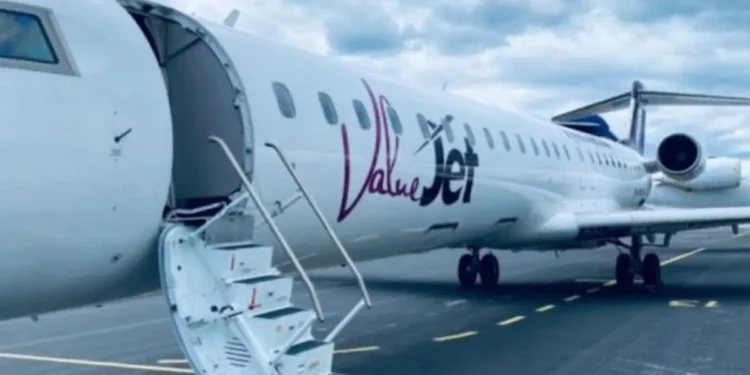ValueJet Pilots Suspended After Departing Without ATC Clearance at Abuja Airport

A recent incident at the Nnamdi Azikiwe International Airport in Abuja has raised serious concerns about aviation safety practices in Nigeria. The Nigeria Civil Aviation Authority, NCAA, has announced the immediate suspension of two ValueJet pilots for violating a critical flight protocol. According to reports, the flight crew initiated takeoff without receiving official clearance from air traffic control, a mandatory step in every flight operation.
The event happened on Tuesday, August 5, 2025, at the domestic terminal of the airport. It involved a ValueJet aircraft that began its departure procedures before receiving the green light from the tower. While there were no casualties or direct harm, the aviation authority emphasized that such actions pose severe risks not only to passengers and crew on board but also to ground personnel and other aircraft operating at the airport.
Air traffic control clearance is a key safety requirement in aviation. It ensures that the runway is free of obstacles, ground vehicles, and other aircraft. Without this clearance, an aircraft could potentially collide with others, resulting in tragic accidents. By proceeding without authorization, the ValueJet crew compromised the integrity of standard flight operations and breached the safety system designed to protect lives.
The NCAA did not take the incident lightly. In a statement issued by Michael Achimugu, Director of Public Affairs and Consumer Protection, the regulatory body confirmed that both the pilot and co-pilot involved had their licenses suspended immediately. The pilots were identified as Captain Oluranti Ogoyi and First Officer Ivan Oloba. Their suspension will remain in place pending the outcome of a thorough investigation.
Preliminary findings indicate that the flight crew began departure from their designated bay without waiting for proper clearance. The NCAA described the situation as a serious breach and one that could have had disastrous consequences. The aviation authority reaffirmed its commitment to upholding safety standards and warned that any violation of these standards will be met with decisive action.
Takeoff clearance is not a trivial step. It is a formal permission given by air traffic control to confirm that conditions on the runway are safe. Airports are busy environments where multiple flights are landing, taking off, and taxiing across complex systems of runways and taxiways. A single misstep can lead to chain-reaction disasters. That is why all aircraft are required to wait for clear, unambiguous permission before beginning any movement on the runway.
In this particular case, the ValueJet aircraft’s unauthorized movement set off alarms. It raised questions about possible communication failures or disregard for established procedures. Thankfully, no accidents occurred, but the potential for harm was very real. As a result, the NCAA acted swiftly to prevent a recurrence.
The aviation authority also stressed that safety is non-negotiable. The fact that the flight crew included a senior captain makes the situation even more troubling. With years of experience comes greater responsibility, and airline staff are expected to model best practices at all times.
Beyond the suspension of the pilots, this incident has broader implications for the aviation industry in Nigeria. It prompts a closer look at ValueJet’s internal protocols and how well its flight crews are trained in both technical skills and operational discipline. It also opens up the conversation about cockpit culture, crew resource management, and whether systemic issues could lead to future lapses.
Aviation analysts have suggested that ValueJet and other carriers should take this moment as an opportunity to revisit training procedures and reinforce a culture of safety within their operations. They also point to the importance of regular simulation drills that test crew responses to real-life operational scenarios, including the importance of waiting for ATC clearance.
For passengers, incidents like this may not always make the headlines, but they reflect the invisible web of safety measures that keep air travel reliable. Every passenger who boards a flight does so with the expectation that the crew will operate within the strict guidelines set out by regulatory bodies. When those guidelines are ignored, it shakes public trust.
The NCAA, through this disciplinary action, is sending a strong message to all airlines and aviation professionals in Nigeria. Compliance is not optional. Protocols exist to safeguard human lives, and no one is above them. Whether it is a delay of a few minutes or a matter of convenience, there is no justification for ignoring procedures that protect everyone involved in a flight operation.
As investigations continue, it remains to be seen what further measures may be taken. The pilots involved will face a review, and depending on the findings, more serious sanctions could follow. Meanwhile, the incident has ignited a renewed conversation about vigilance, responsibility, and accountability in Nigeria’s aviation sector.
For now, the focus is on preventing such an incident from happening again. That involves not just punishing those at fault but also identifying the root causes that allowed such a breach to occur. With continued attention and corrective action, the goal is to ensure safer skies for everyone flying in and out of Nigeria.





Responses